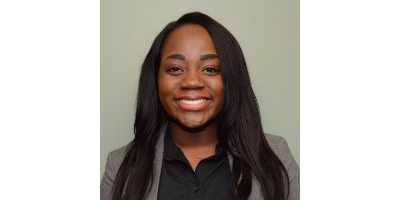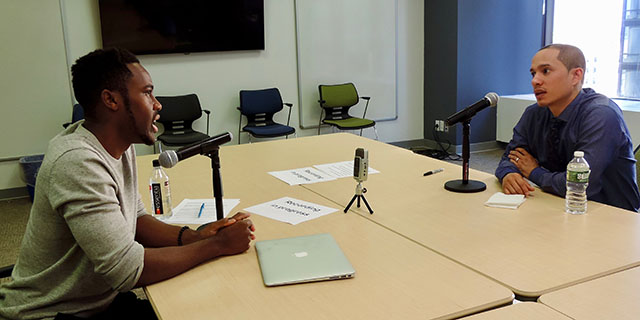News | From the Clean Slate Clearinghouse
Dina Sarver Charts a Course from Juvenile Record to JD
February 14, 2018
Dina Sarver was 21 years old when she began nursing school in Florida, where she lived with her young son. She’d gotten into some trouble with the law as a teenager, but she was ready to put her past—and her juvenile criminal record—behind her and start a career.

"It was during my incarceration that I realized that I wanted to be somebody different"
By Rashawn Davis and Carla Sinclair, CSG Justice Center staff
Dina Sarver is a second-year law student at the University of Miami School of Law. She is also a member of the Clean Slate Clearinghouse Advisory Committee.
Dina Sarver was 21 years old when she began nursing school in Florida, where she lived with her young son. She’d gotten into some trouble with the law as a teenager, but she was ready to put her past—and her juvenile criminal record—behind her and start a career.
She never got past orientation.
The school revoked Sarver’s acceptance to the program after she divulged information about her juvenile record during the school’s orientation process—information she’d thought was automatically wiped from her record when she turned 18. After realizing that her records were still out there, she ran an $18 background check on herself and saw how accessible they really were.
“I was shocked, because here I am thinking … ‘These records are supposed to be confidential. No one should access them,’” she said. “But that wasn't the case.”
The barriers to employment were becoming increasingly clearer and more difficult to overcome. Sarver began researching other career paths, “trying to find a job that paid reasonably and didn't require a fingerprint,” but her options were few and far between.
“As soon as you hear ‘dependent on favorable background check,’ you know that job is out of the question,” Sarver said.
That’s when she started sending emails—75, to be exact—to advocates and juvenile justice organizations across Florida, explaining her story and asking for help.
“I don't know how my email made it to Washington, DC, but I got a call from the Office of Juvenile Justice Delinquency and Prevention [OJJDP],” Sarver said. “She said, ‘I want to help you.’”
Sarver was first arrested when she was 13 years old for “disruption of a school function” in her school in Florida. After that, her involvement in the juvenile justice system became more frequent. At the time, she thought little of it, assuming she could move past her mistakes when she got older. No one told her back then, she said, about the long-term repercussions of having a juvenile record.
“I had probation officers who were like, ‘you need to turn your life around, because when you’re 18 you won’t have all these chances,’” she said. “Obviously they didn’t understand that once you turn 18, that does not mean that your juvenile record won’t follow you. Here I am thinking … once I’m 18 I would have a clean slate.”
At 15, while pregnant with her first child, Sarver was sentenced to six months in a juvenile residential facility.
“It was during my incarceration that I realized that I wanted to be somebody different,” she said.
After her release, Sarver obtained her GED and began pursuing her associate’s degree, without knowing that her record was following her every step of the way. Losing her seat in that nursing program was Sarver’s first reality check, and she soon found out that under Florida law, her juvenile record wouldn't be removed from public accessibility until she turned 24 years old.
“I just remember [the nursing program coordinator] saying it doesn't matter when you were arrested or what you were arrested for, you need to disclose it,” Sarver said. “… I remember being very distraught.”
It wasn't until the representative from OJJDP heard her story and offered to help that Sarver was able to take steps to move beyond her past. Together, staff from OJJDP and various attorneys advocated on Sarver’s behalf to her college, encouraging them to give her a second chance by allowing her to matriculate. Ultimately, Sarver was able to earn her bachelor’s degree in another healthcare related program.
Her experience trying to overcome her juvenile record ended up influencing her career path in more ways than one: it made Sarver realize that her calling was not in nursing, but in law. She wanted to help other young people dealing with the effects of juvenile records in the same way she had been helped.
“What got me motivated were those attorneys,” she said. “They were on my side … And that made all the world of a difference, because it was almost as if I wasn’t fighting for no reason, I had a valid stance and someone acknowledged it.”
Now in her second year of law school, Sarver is preparing to sit for the bar exam in 2019. Her journey from a small juvenile facility in Florida to law school was not an easy one, and speaks to the powerful effects and collateral consequences a criminal record can have on someone, particularly those trying to turn their lives around.
As a record clearance advocate, Sarver said she hopes to use her growing platform to help galvanize the conversation about criminal record clearance and to show what it means to give those who may have made mistakes in the past a second chance. Primarily, however, Sarver points to one factor she says is most important in the record clearance discussion.
“Education. It would definitely have to be education,” she said. “Because the more people are aware, the more they will realize that these consequences are out there.”


